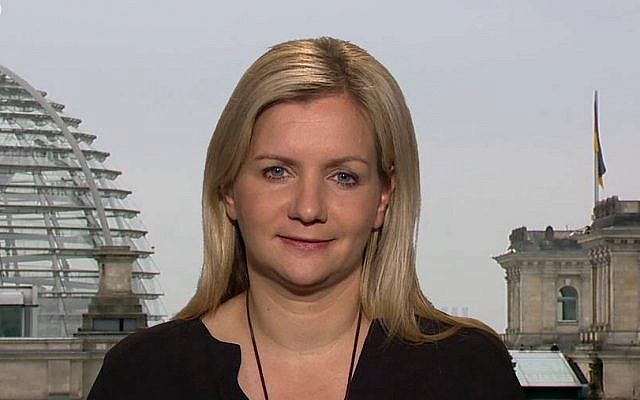Dangerous Times for Politics in Europe
There is considerable fear that the right-wing party, Alternative for Germany, or AfD, is becoming too powerful.
There is increasing concern among many in Germany about the rapid growth of radical right-wing politics that is reshaping the political landscape there. That was part of the message that members of the American Jewish Committee heard recently when they sat down with the American correspondent for Berlin’s largest newspaper.
Juliane Schauble of the German newspaper Der Tagesspiegel, told a Feb. 12 lunchtime gathering at AJC’s Buckhead offices that there is considerable fear that the right-wing party, Alternative for Germany, or AfD, is becoming too powerful. Since the party’s founding in 2013, it has gained representation in local parliaments in every one of Germany’s 16 states. In the national election 1 ½ years ago, the party won 94 seats out of a total of 709 in the Reichstag.
This was the first time since the defeat of Nazi Germany in World War II that such an extreme party, which has been linked to a resurgence of anti-Semitism in the country, has won seats in the national parliament. In a poll last September, they were picked as Germany’s second most popular party, just edging out the mainstream Social Democratic party.
“It is totally new for Germany and it’s a very difficult situation right now,” Schauble said. “In at least one state, Saxony, they could be the biggest party in the parliament there. It is a terrible development. They could get as much as 30 percent of the vote in Saxony.”
Although the extremist party’s strength is growing, and it is likely to gain new support in state elections later this year, it is unlikely that it will be able to govern anywhere in Germany soon. So far, the AfD has been shunned by the political establishment; not a single party has shown a willingness to participate with it in a coalition government.
“While there is no party in Germany that would go into a coalition, the extremists are much too strong,” she said. “So I think it is very important for the big parties to do something against it because it is a big threat to German democracy.”
The growth of the AfD, particularly in what was formerly Communist East Germany, has been fueled, in part, by the neglect that large political parties have shown that part of the country.
“It is very similar to the situations of some of those who voted for Trump. People feel neglected, particularly in the underdeveloped East,” Schauble said. “People don’t feel that they are being heard.”
Part of the difficulty is the result of the decision by the government of Chancellor Angela Merkel to admit more than a million refugees in recent years, many of them from Syria, Iraq, Afghanistan and other predominantly Islamic nations. There has been a growing backlash that establishment politicians are only now beginning to take seriously.
“The so-called refugee crisis of 2015 and 2016 created considerably hostility, particularly in the East. They are not very used to welcoming refugees. Many of the newcomers are Muslim, many of them are young men. They really object to Chancellor Merkel’s policy of letting them in our country. For a long time we didn’t listen to their fears.”
The growth of extreme right-wing parties is widespread in Europe. They have a strong voice in Italy, Greece and Austria, and they and their allies are a threat in France. Eastern European governments in Hungary, Poland and Slovenia are dominated by parties that have strong nationalistic and anti-immigrant policies.
All this is likely to come to a head in the next several months as campaigning begins for parliamentary elections for the European Union, which are set for late in May. Right-wing nationalists across Europe are said to be working hard to take over the European parliament.
Prime Minister Viktor Orban of Hungary called the elections an opportunity “to transform Europe, to ship it into a post-Christian era, and into an era when nations disappear.” His allies in Italy, led by Matteo Salvini of the anti-immigrant, Northern League party and the young Austrian Chancellor Sebastian Kurz stand with him in what they see as a battle to preserve their national identity against an invading horde of immigrants.
Schauble is hopeful that mainstream German politicians have what it takes to resist a takeover from the right.
“Many Germans say we must do something to help Emmanuel Macron be successful in France, and to help the UK and Italy to overcome their challenges. It is a huge problem right now, but I hope it brings the people and their parties together, gives them a push to say, ‘This is what we have to do to make Europe an effective political model again.’ You have so many people in the European Union now who want to do something against the European Union. We need all the power we can get to move forward, not backward.”




comments